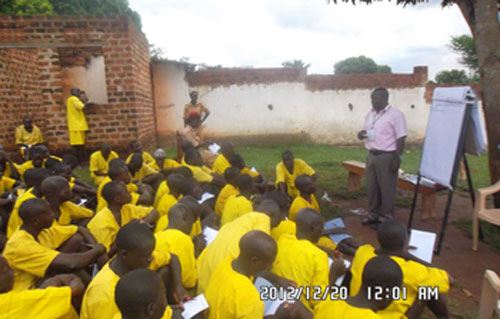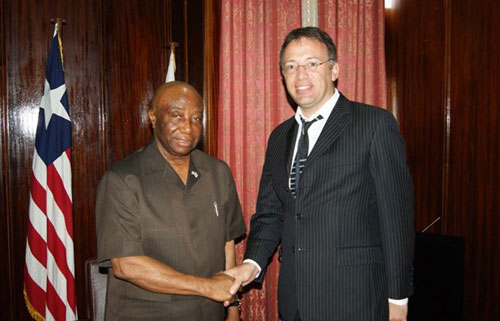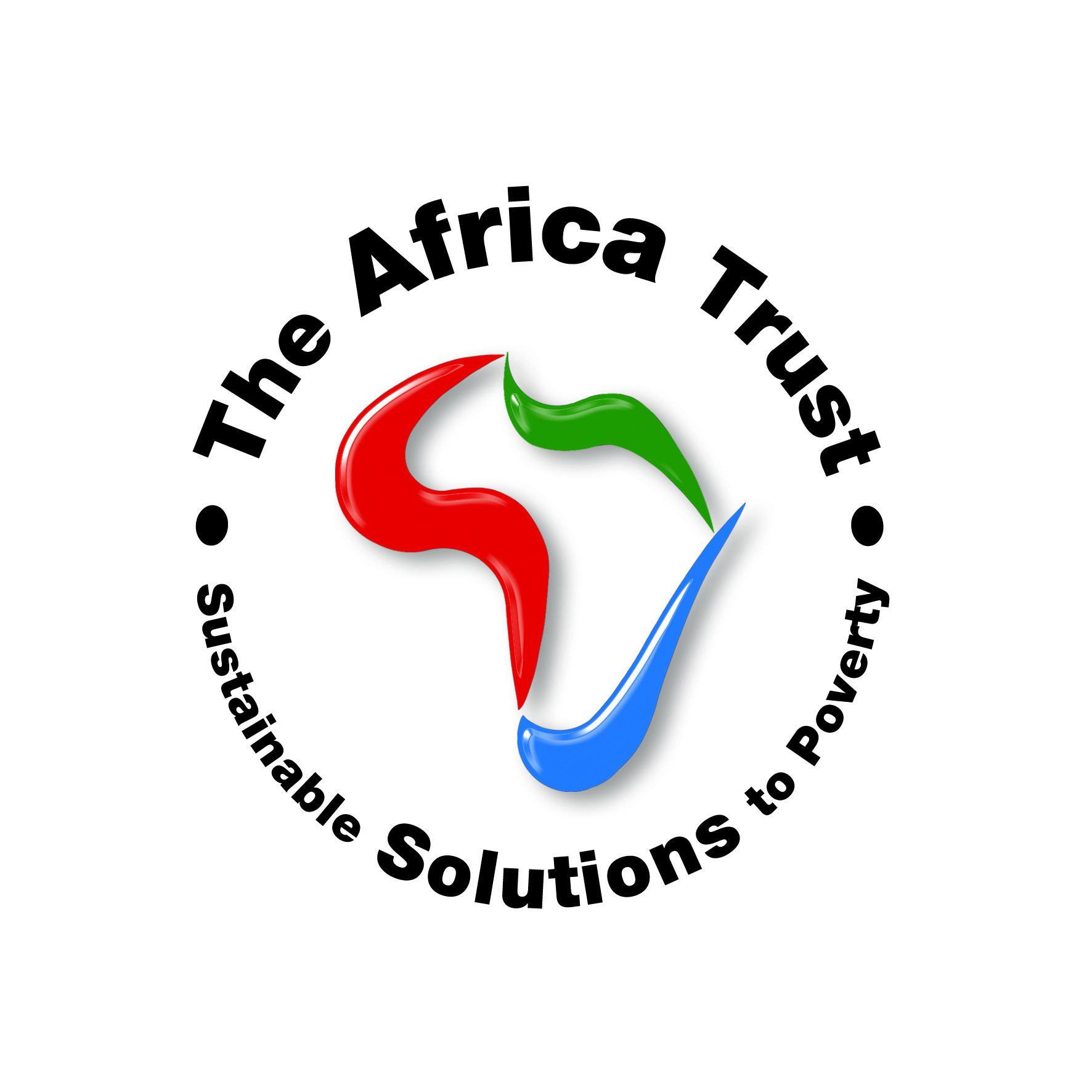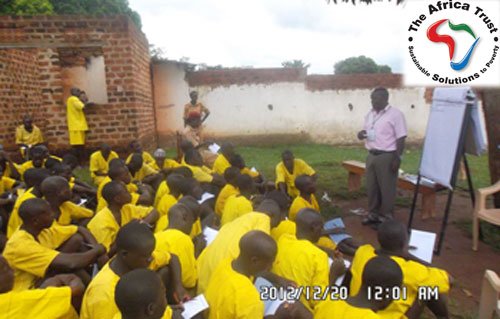Overview
With funding from AquAid, the Africa Trust has gone through a period of remarkable growth during the last twelve months. The pump installation and sanitation program has been expanded within Zimbabwe and over the eastern border into Mozambique. Groundwork has also been completed for a new pump installation program to start in Liberia later this year. There has been an expansion of the water pipeline program in Tanzania and seed loans have been provided for dozens of small income generating projects to be established. These include over forty small businesses in Malawi and Kenya and an extension of the dairy cattle project in Zimbabwe along with the banana-growing project, which is paying school fees for over 500 orphans and vulnerable children. Thousands of people received business skills training from the Africa Trust during the last year and village savings and loans associations were established in Uganda and Tanzania to help people save and lend money within a tightly bonded group, thereby avoiding punitive interest rates. The core ethos of sustainability has been built into all the new projects with loans, rather than grants being issued to help start up new businesses and with income generating projects such as motorbike taxis being established to create employment and to bring in additional income for the Africa Trust.
In total over 110,000 new beneficiaries were reached in the last year.
Country Programs – Zimbabwe
The core program of pump building in Zimbabwe has grown with 432 Elephant Pumps installed in 2012 compared to 367 in 2011. Maintenance and repair costs have risen slightly, as staff attempt to reach more of the existing five thousand plus pumps and address maintenance problems that they encounter. This is now a massive program with Elephant Pumps, managed by the Africa Trust, providing clean water for over 10% of the entire population of Zimbabwe. In addition to the core staff, it has been possible to provide contract work to over 40 other individuals (mainly former employees of Pump Aid) during the course of the year.
Sanitation work continues to expand, with 162 new Elephant Toilets installed during 2012. The aim has been to assist in one community in an attempt to completely eradicate open defecation. Installation of toilets is combined with education in a community led total sanitation approach. If funding can be secured, this pilot program needs to be expanded massively as the sanitation infrastructure in Zimbabwe and other countries is totally inadequate. Many of the rural schools in Zimbabwe lack decent sanitation, as do the rural communities. This is the major reason why Zimbabwe has recorded some of the worst outbreaks of cholera in Africa along with a high incidence of other waterborne diseases.
Over 500 students continue to benefit from the banana growing project for schools with an additional 24 students added during the year. Some extra costs were incurred due to damage to fences, but there was a second successful harvest and this project continues to deliver a sustainable solution allowing the most vulnerable children to remain in school. Two separate banana plantations were established along with a banana seedling nursery project, which will generate significant income for the Africa Trust in Zimbabwe especially at harvest, towards the end of this year. A pool table rental project was established and has grown to provide funding for work in the prisons. Purchase of maize proved popular as the Africa Trust offered farmers a better price than they would have otherwise achieved. The stored grain has appreciated in value, but instead of selling it over the next month or two it is being used to provide emergency food relief to avert starvation where this was a real threat. The dairy cattle project has been extended in the eastern highlands.
Uganda
In Uganda there was a significant investment in business skills training in 2012, which has helped to establish a large program. Over 3,000 people were trained and a significant proportion of these went on to establish successful businesses. An independent survey produced encouraging feedback on the impact of this program. They found that more than a third of the people trained went on to start their own business. There is however much less poverty in Uganda compared to other countries where we are operating. For this reason, the budget for Uganda will be reduced by more than 50% in 2013, as more of the available funding is allocated to promote new businesses in countries such as Malawi. The leader of the Uganda program has been encouraged to seek funding from other sources to continue growing the operation. He recently went on a fundraising visit to the States and has been looking into securing local contracts for business skills training.
Here are his comments from one training course:

“I am doing an unusual business training class for more than 60 prisoners inside a prison today. There are only 3 ladies among them. They have appreciated the training and they say they see a pathway of earning a legitimate and decent living after they are released from custody. We specifically asked for those who will be released in the next three months.
Today, as I was about to begin the days class I heard gunfire outside the prison fence, one of the prisoners was trying to escape (good or bad, he was not one of my class). The prison guards gave a chase and the whole prison went on a lock down for two hours. I felt as if I was also a prisoner. The escaping prisoner was nabbed after a long chase, brought back to the prison and heavily punished. The class was given a go ahead to continue, because the prison authorities believe its critical and complements their work well and could potentially reduce the re-offending rate.” Livingstone Mukasa
Malawi
In Malawi, a business skills training program has been established using Namisu Orphanage as a base. Malawi is much poorer than Uganda so it is necessary to provide loans for people to start businesses in addition to providing training. With the employment of one member of staff to run this program, it is hoped that there will be an improved success rate although we are still willing to take risks and some individuals will fail to repay their loans. The aim is to develop a small but growing revolving fund, which will assist hundreds of individuals to establish their own businesses. Joshua Searle has taken on responsibility for line-managing our man on the ground and he is helping to identify individuals who should receive funding for their business proposals. I have also asked Josh to identify and quantify income generation opportunities in Malawi.
Tanzania
We have an excellent project manager in Tanzania who has successfully established and manages two extensive gravity-fed water pipelines after I did the initial survey and mapping work. He has also provided input for a third pipeline, which is being installed in collaboration with Dorcas Aid. He has been successful in mobilizing entire communities to assist in the digging of trenches and has also established a couple of village level savings and loans associations. These associations allow people to save and borrow in groups rather than being subject to loan sharks who often charge in excess of 20% a month. Johnston has also established and now manages a motorbike taxi business, which is described below.
Kenya
Following business skills training, a group of individuals, mainly pastors, has been assisted with loans to start various businesses. Bishop Sammy is providing monthly updates. He has achieved a very low default rate with loan repayments. He has also identified three pastors who are currently renting bikes on a trial basis to raise funds for the Africa Trust.
Mozambique
A pump building program has been seeded in Mozambique in partnership with Dorcas Aid International. The plan is to run this pilot program with a small number of pumps for a year so that the government can grant formal approval for the technology. With this approval, it will then be possible to expand the program across the country. Mozambique has a border with Zimbabwe, so it was a logical choice for expansion. In addition to pump building, there are also plans to do business skills training and sanitation work (also in collaboration with Dorcas Aid).
South Africa
In the eastern cape, which is the poorest province of South Africa, a couple of small projects are being established to raise income for the Africa Trust. A barber and hair-dressing salon has been established which employs four people and is expected to pay for itself within 14 months. Thereafter the salon is expected to produce profit, which will cover the costs of our project manager while continuing to provide employment. Khanyi is exploring a number of interesting business opportunities including a tuk tuk taxi business and the manufacture of toilet paper.
Liberia
Preparatory groundwork was completed for the launch of a new country program in Liberia by the middle of 2013. The departure of Pump Aid at the end of 2012 provided an opportunity to purchase much of the equipment needed to establish a pump and toilet building program. I was able to meet with all the former Pump Aid staff in Liberia and all are keen to secure employment with the Africa Trust once operations commence. We have an opportunity to help former child soldiers put their past behind them and focus on gainful employment, which also helps the community.
I met with the Vice-President of Liberia and with all the relevant ministers to discuss possibilities for the Africa Trust to assist in that country. It is clear that the government is keen for us to expand the Elephant Pump and Elephant Toilet programs which I set up when working for Pump Aid.

I also see great potential for household water filtering using locally made ceramic filters, which I have designed to filter water that is harvested from tin roofing sheets. It rains a lot in Liberia, and the main issue is quality of water. The ceramic filters are made in the same way as ordinary clay pots except that fine powder sawdust is mixed with the wet clay to produce the fine porosity that filters out cysts, sediment and even bacteria. Colloidal silver is painted on the inside of the pot to destroy viruses and inhibit algal growth. A storage tank is needed with closed guttering running into it. Clean filtered water can be sold or used.
Liberia is a country where you meet people in the most desperate situations everywhere you go. A huge number of people had both their hands cut off during the horrendous civil war and it is hard to comprehend how they have survived. Apart from individuals who have been physically maimed, the majority of the population has been psychologically damaged by the atrocities they experienced or witnessed. The emergency relief fund allowed for some of the people I met to receive small, but life saving amounts of money to help them have some hope of surviving. Along with prisoners in Zimbabwe, who also benefit from the emergency relief fund, I have never witnessed people in such desperate situations anywhere else in my 25 years working in 32 countries across Africa.
We have started helping former child soldiers to tell their stories from the war including one girl who taken to be a soldier at the age of seven. She was raped repeatedly and forced to shoot her own step-mother and was then drugged and indoctrinated into committing atrocities. Another boy aged eight, was wrapped in barbed wire and left to die at the mercy of black biting ants in a pit filled with human body parts because he refused to kill his friend. Hundreds were raped and tortured including one boy who was forced to drink battery acid, which caused terrible internal damage. I feel very strongly that people who have been through such terrible experiences deserve a chance to create new lives for themselves. We look forward to employing a number of former child soldiers and to assisting others to start small businesses such as riding motorbike taxis.
The Motorbike Taxi Business
We have commenced a motorbike taxi business to raise funds for the Africa Trust in three countries and will shortly be starting in a fourth. This is effectively a rental business whereby the rider pays a daily rate, which we typically set at around 20% lower than the market rate that riders normally pay. This provides a good income to the rider, which is higher than other riders who are renting on the open market. Through this business, we are providing employment to carefully selected individuals. The bikes cost around a thousand dollars to buy new, depending on the model and a further two or three hundred dollars is spent on the initial registration, training, safety clothing and licensing. We expect each bike to operate for four years.
Net income in Kenya (after allowing for oil changes and minor repairs) is $3.3 per day for 300 days a year = $990 per year per bike. It will take 15 months to recover the cost of the bike and then the next 33 months will yield profit of around $2,000 (allowing for repairs and annual licensing). The bike will then be given to the rider when it has been in use for four years. In Tanzania, a slightly higher return of $3.5 per day for 300 days a year is possible, and in Liberia the daily income is significantly higher at $4,8 a day. This means that the cost of the bike is recovered in 11 months and the next 37 months will yield profit of around $3,500. We currently have two bikes operating in Liberia, three in Kenya and five in Tanzania.
Liberia is a more risky country with regards to theft and security, but each bike allows one former child soldier to have an income, which can support their family. In Kenya, the riders selected so far are all pastors, who are able to combine this work six days a week along with their ministry. In Tanzania, we have carefully selected reliable individuals to ride the bikes and Johnston, who is overseeing the program, is very competent and trustworthy. In Kenya and Tanzania riders can send their daily or weekly rental by mobile phone, but in Liberia, the rider brings their weekly rental to a central location as cash.
In the eastern cape of South Africa (the poorest province in the country) we are starting a three-wheel tuk tuk taxi business since motorbike taxis are not allowed. The first tuk tuk will arrive next week from China and is expected to provide an average daily income of around $12 for 300 days a year which would mean that the cost is recovered in around one year and thereafter it is hoped that there will be a further three years of profitable usage, raising funds for the Africa Trust. We do however still need to get actual figures from the first tuk tuk before we can make more confident and informed projections. In Malawi, bicycles are commonly used as taxis, and we are keen to get into the bicycle rental business. We are yet to have reliable figures for this business, but it may well have significant potential to generate profit while providing employment. We are considering providing some prisoners with bicycles as they are released (after they have undergone business skills training in prison prior to their release). This should help to reduce the rate of re-offending.
Summary
In summary, AquAid funding over the last year has enabled the Africa Trust to expand its core program of establishing sustainable supplies of clean water across Africa. In addition, it has been possible to increase the diversity and number of projects in new regions and countries. Each AquAid water-cooler is making a difference and helping to provide sustainable solutions to poverty in Africa.
Thank you for your support.
Ian Thorpe
Chief Executive
The Africa Trust.

